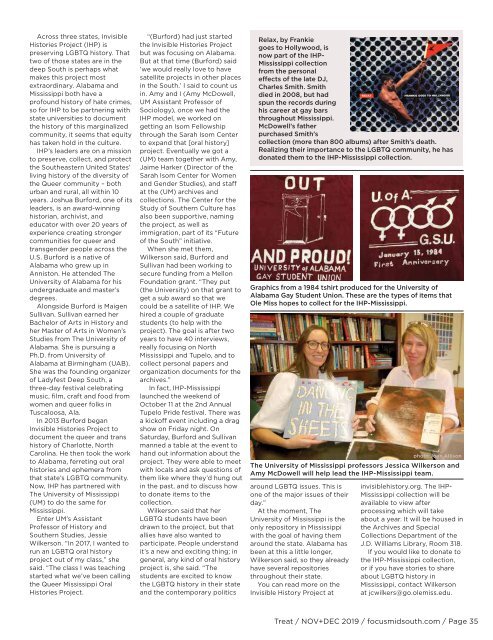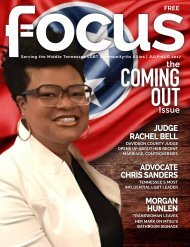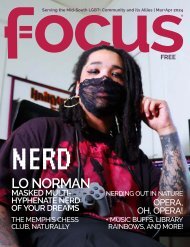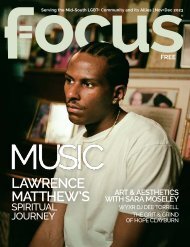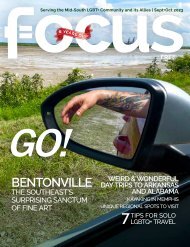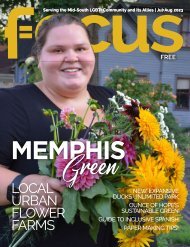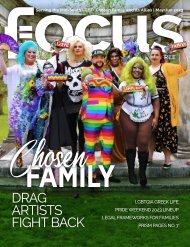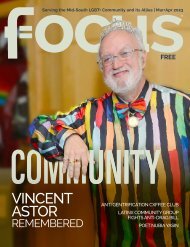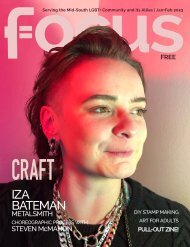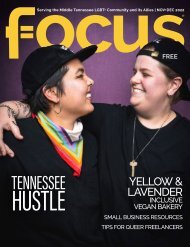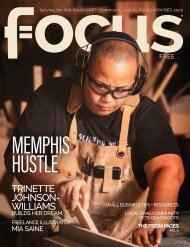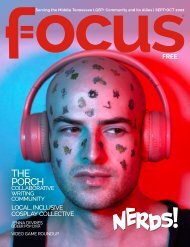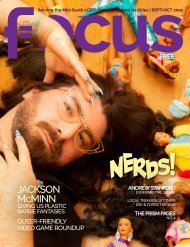2019 Issue 6 Nov/Dec - Focus Mid-South Magazine
Create successful ePaper yourself
Turn your PDF publications into a flip-book with our unique Google optimized e-Paper software.
Across three states, Invisible<br />
Histories Project (IHP) is<br />
preserving LGBTQ history. That<br />
two of those states are in the<br />
deep <strong>South</strong> is perhaps what<br />
makes this project most<br />
extraordinary. Alabama and<br />
Mississippi both have a<br />
profound history of hate crimes,<br />
so for IHP to be partnering with<br />
state universities to document<br />
the history of this marginalized<br />
community, it seems that equity<br />
has taken hold in the culture.<br />
IHP’s leaders are on a mission<br />
to preserve, collect, and protect<br />
the <strong>South</strong>eastern United States’<br />
living history of the diversity of<br />
the Queer community – both<br />
urban and rural, all within 10<br />
years. Joshua Burford, one of its<br />
leaders, is an award-winning<br />
historian, archivist, and<br />
educator with over 20 years of<br />
experience creating stronger<br />
communities for queer and<br />
transgender people across the<br />
U.S. Burford is a native of<br />
Alabama who grew up in<br />
Anniston. He attended The<br />
University of Alabama for his<br />
undergraduate and master’s<br />
degrees.<br />
Alongside Burford is Maigen<br />
Sullivan. Sullivan earned her<br />
Bachelor of Arts in History and<br />
her Master of Arts in Women’s<br />
Studies from The University of<br />
Alabama. She is pursuing a<br />
Ph.D. from University of<br />
Alabama at Birmingham (UAB).<br />
She was the founding organizer<br />
of Ladyfest Deep <strong>South</strong>, a<br />
three-day festival celebrating<br />
music, film, craft and food from<br />
women and queer folks in<br />
Tuscaloosa, Ala.<br />
In 2013 Burford began<br />
Invisible Histories Project to<br />
document the queer and trans<br />
history of Charlotte, North<br />
Carolina. He then took the work<br />
to Alabama, ferreting out oral<br />
histories and ephemera from<br />
that state’s LGBTQ community.<br />
Now, IHP has partnered with<br />
The University of Mississippi<br />
(UM) to do the same for<br />
Mississippi.<br />
Enter UM’s Assistant<br />
Professor of History and<br />
<strong>South</strong>ern Studies, Jessie<br />
Wilkerson. “In 2017, I wanted to<br />
run an LGBTQ oral history<br />
project out of my class,” she<br />
said. “The class I was teaching<br />
started what we’ve been calling<br />
the Queer Mississippi Oral<br />
Histories Project.<br />
“(Burford) had just started<br />
the Invisible Histories Project<br />
but was focusing on Alabama.<br />
But at that time (Burford) said<br />
‘we would really love to have<br />
satellite projects in other places<br />
in the <strong>South</strong>.’ I said to count us<br />
in. Amy and I (Amy McDowell,<br />
UM Assistant Professor of<br />
Sociology), once we had the<br />
IHP model, we worked on<br />
getting an Isom Fellowship<br />
through the Sarah Isom Center<br />
to expand that [oral history]<br />
project. Eventually we got a<br />
(UM) team together with Amy,<br />
Jaime Harker (Director of the<br />
Sarah Isom Center for Women<br />
and Gender Studies), and staff<br />
at the (UM) archives and<br />
collections. The Center for the<br />
Study of <strong>South</strong>ern Culture has<br />
also been supportive, naming<br />
the project, as well as<br />
immigration, part of its “Future<br />
of the <strong>South</strong>” initiative.<br />
When she met them,<br />
Wilkerson said, Burford and<br />
Sullivan had been working to<br />
secure funding from a Mellon<br />
Foundation grant. “They put<br />
(the University) on that grant to<br />
get a sub award so that we<br />
could be a satellite of IHP. We<br />
hired a couple of graduate<br />
students (to help with the<br />
project). The goal is after two<br />
years to have 40 interviews,<br />
really focusing on North<br />
Mississippi and Tupelo, and to<br />
collect personal papers and<br />
organization documents for the<br />
archives.”<br />
In fact, IHP-Mississippi<br />
launched the weekend of<br />
October 11 at the 2nd Annual<br />
Tupelo Pride festival. There was<br />
a kickoff event including a drag<br />
show on Friday night. On<br />
Saturday, Burford and Sullivan<br />
manned a table at the event to<br />
hand out information about the<br />
project. They were able to meet<br />
with locals and ask questions of<br />
them like where they’d hung out<br />
in the past, and to discuss how<br />
to donate items to the<br />
collection.<br />
Wilkerson said that her<br />
LGBTQ students have been<br />
drawn to the project, but that<br />
allies have also wanted to<br />
participate. People understand<br />
it’s a new and exciting thing; in<br />
general, any kind of oral history<br />
project is, she said. “The<br />
students are excited to know<br />
the LGBTQ history in their state<br />
and the contemporary politics<br />
Relax, by Frankie<br />
goes to Hollywood, is<br />
now part of the IHP-<br />
Mississippi collection<br />
from the personal<br />
effects of the late DJ,<br />
Charles Smith. Smith<br />
died in 2008, but had<br />
spun the records during<br />
his career at gay bars<br />
throughout Mississippi.<br />
McDowell’s father<br />
purchased Smith’s<br />
collection (more than 800 albums) after Smith’s death.<br />
Realizing their importance to the LGBTQ community, he has<br />
donated them to the IHP-Mississippi collection.<br />
Graphics from a 1984 tshirt produced for the University of<br />
Alabama Gay Student Union. These are the types of items that<br />
Ole Miss hopes to collect for the IHP-Mississippi.<br />
The University of Mississippi professors Jessica Wilkerson and<br />
Amy McDowell will help lead the IHP-Mississippi team.<br />
around LGBTQ issues. This is<br />
one of the major issues of their<br />
day.”<br />
At the moment, The<br />
University of Mississippi is the<br />
only repository in Mississippi<br />
with the goal of having them<br />
around the state. Alabama has<br />
been at this a little longer,<br />
Wilkerson said, so they already<br />
have several repositories<br />
throughout their state.<br />
You can read more on the<br />
Invisible History Project at<br />
photo Joan Allison<br />
invisiblehistory.org. The IHP-<br />
Mississippi collection will be<br />
available to view after<br />
processing which will take<br />
about a year. It will be housed in<br />
the Archives and Special<br />
Collections Department of the<br />
J.D. Williams Library, Room 318.<br />
If you would like to donate to<br />
the IHP-Mississippi collection,<br />
or if you have stories to share<br />
about LGBTQ history in<br />
Mississippi, contact Wilkerson<br />
at jcwilkers@go.olemiss.edu.<br />
Treat / NOV+DEC <strong>2019</strong> / focusmidsouth.com / Page 35


